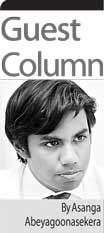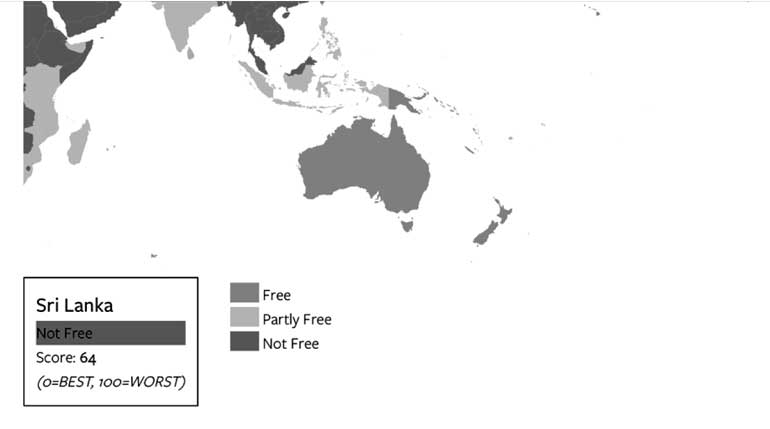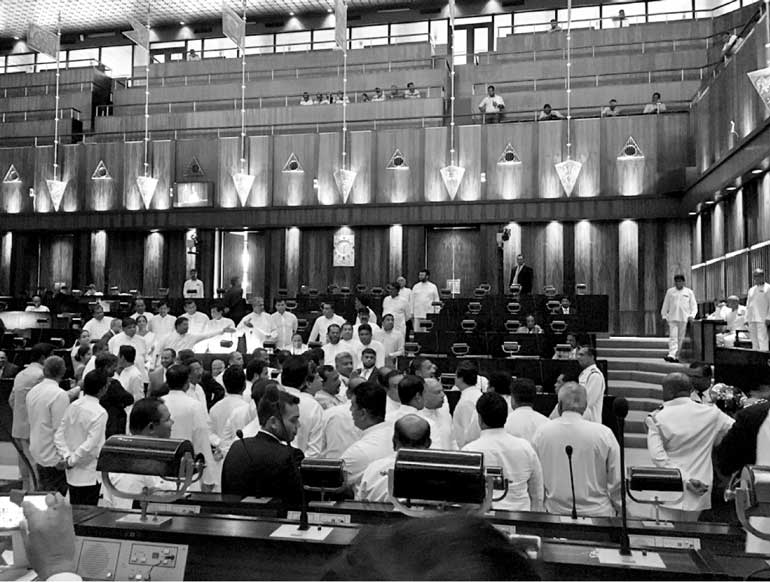Thursday Feb 26, 2026
Thursday Feb 26, 2026
Saturday, 7 May 2016 00:00 - - {{hitsCtrl.values.hits}}
 World Press Freedom Day is marked on 3 May. Among other factors, unimpeded violence against the press culminated in the Silent Revolution one year ago. Of this violence included injustice toward media giants, press freedom fighters such as Lasantha Wickrematunge and many others who were brutally assassinated. The contribution of Sri Lankan journalists over decades of civil war and before remains immense. Despite multi-fold limitations to freedom they continued work, which needs to be appreciated.
World Press Freedom Day is marked on 3 May. Among other factors, unimpeded violence against the press culminated in the Silent Revolution one year ago. Of this violence included injustice toward media giants, press freedom fighters such as Lasantha Wickrematunge and many others who were brutally assassinated. The contribution of Sri Lankan journalists over decades of civil war and before remains immense. Despite multi-fold limitations to freedom they continued work, which needs to be appreciated.
I remember the words of Ariyarathna Dombagahawatta, senior journalist and Sunday Lankadeepa Editor some time ago; he said during the insurrection in 1989 he fled the country to India as the assassins targeted to kill him and he only returned after this horrific time. A politician who was kind to him helped him to save his life by calling his contacts in India.
According to the Freedom of the Press Report 2016 by Freedom House, Sri Lanka is ranked at 64. This is not a positive rank comparison to our neighbours with India at 41 (Nepal 54, Bangladesh 61, Pakistan 64 and Afghanistan 62). Sri Lanka is categorised out of Free, Partially Free and Not Free categories as a country “Not Free” for the press, the report confirms.


The report explains: “Unlike its neighbours, Sri Lanka experienced a marked improvement in press freedom conditions after a new Government took power in early 2015. Journalists faced fewer threats and attacks than in previous years, investigations into past violence made progress, a number of websites were unblocked, and officials moved toward the adoption of a Right to Information Bill.”
Another report is Press Freedom Index by Reporters Without Borders, which ranks Sri Lanka at a poor 141st place, before us ranks South Sudan and on par with us sits Ethiopia. I hope the next year reports will improve the status of our country as the new Government is working hard to fully implement Right to Information Act with amendments to the existing act tabled to Parliament  and also fully restore media freedom.
and also fully restore media freedom.
After 14 months of careful study a comprehensive report, ‘Rebuilding public trust- an assessment of media industry and profession in Sri Lanka,’ was handed over to the Prime Minister with 101 important recommendations to rectify the issues in our media industry by the media experts and stakeholders. Hopefully we will see some progress in implementing the recommendations.
Health of individual citizen
With the ongoing increase in tax on private medical services which will be higher in future, I wonder how the common people could afford even today and after the completion of our own Mount Elizabeth. The common people will find it difficult to obtain medical services with the tax increase and with their nominal income especially from private hospitals and Government hospitals will be the only hope.
The Health Minister of Sri Lanka who fled the country for medical treatment to Singapore at Mount Elizabeth, a popular hospital for Very Important People (VIPs) of our community when returning to the island was impressed by the quality of service in Singapore said he would build three hospitals as equal to Mount Elizabeth in Sri Lanka. This is a great thought to improve our ailing medical service.
In a recent visit to Norway I learned about the high life expectancy and quality of life and health. Life expectancy in Norway is 81 compared to Sri Lanka at 77 (still a high figure as a South Asian nation). The quality of life is an essential part in the modern era. The water and food you and your family consume should be of highest quality to contribute to long life.
What we hear in Sri Lanka is not a positive story when it comes to our water, food and the certain fertiliser used. Recently 21 trade stalls were seized of unsuitable food for human consumption by health officers in Piliyandala Town and also in Dehiwala-Kohuwala restaurants. Strict measures of legal punishment and regular checks will help to catch these culprits.
Equal to the lives taken for the three decade war, the Chronic Kidney Disease (CKD) has killed 22,000 lives for the last two decades. The CKD is a serious problem in Sri Lanka, World Health Organization reports around 15% of the population in Anuradhapura, Polonnaruwa and Badulla Districts between the age group 15-70 years are affected. WHO believes CKD is an environmental-exposure disease caused by multiple factors such as chronic exposure to kidney damaging pesticides, arsenic, lead, cadmium, poor diet and genetic susceptibility to kidney failure.
Our President made a pledge at Paris COP21 to introduce smart solutions and we should believe in him. I hope the Government will encourage electric cars and other sustainable methods of generating electricity and improve quality of food we consume. With the economic crisis we are facing now as a nation this status may further deteriorate and the political leaders should make the correct policy decisions to improve quality of life. The air we breathe and food we consume should be a top priority, the situation will not help by adding more coal power plants to our nature. Whatever status in society or wealth you possess will not help to cure a chronic illness if we keep polluting our environment at this rate.
Violence against women and children
The tallest Buddha statue in South Asia stand at 135 feet was unveiled by President Sirisena in Matugama was a great deed to spread the message of Dhamma to a world which is in disorder and needs heeling specially at a time when Buddha statues were destroyed by ruthless terrorist such as Taliban in Afghanistan. Addressing the gathering the President said: “Buddhist philosophy has been instrumental in moulding a righteous society in the country and a moral society could be built based on Buddhist philosophy.” On the same day due to the high number of cases reported in the country the Task Force on Prevention of Violence against Women and Girls handed its action plan to the Prime Minister. Buddhism in practice is essential more than a symbol. A principal value of Buddhism is to respect and love women and children; the Buddha once said a nation could be judged how they look after their women and children. Sri Lanka needs to invest and improve in this area.
Parliamentarians should work collectively bearing in mind the critical economic situation and social issues our country is facing. The Parliament ideally should be the most esteemed place to debate to implement the right policy to make our society better, the place we send our representatives to safeguard our children’s future has fallen due to lack of respect and dignity of the Parliamentary space and institution.
Having written to the Education Minister to include global dignity to the school curriculum which will teach children about respect and dignity, I am debating the benefits of introducing the same program to Parliamentarians of my country.